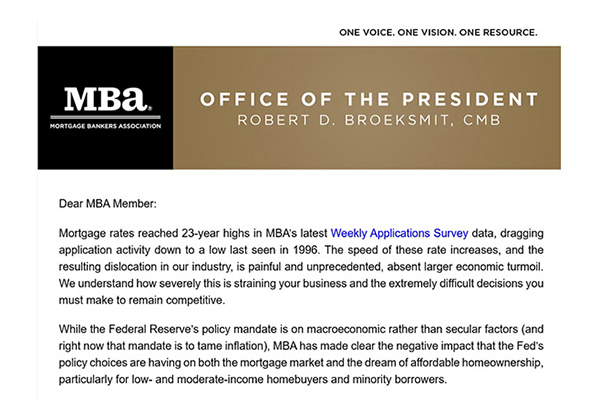
MBA’s Broeksmit: Why Mortgage Rates Continue to Rise and What Can Be Done

As mortgage rates reached 23-year highs in MBA’s latest Weekly Applications Survey and application activity fell to a low last seen in 1996, MBA President and CEO Robert Broeksmit, CMB, issued the following statement.
“The speed of these rate increases, and the resulting dislocation in our industry, is painful and unprecedented, absent larger economic turmoil,” Broeksmit said. “We understand how severely this is straining your business and the extremely difficult decisions you must make to remain competitive.”
“While the Federal Reserve’s policy mandate is on macroeconomic rather than secular factors (and right now that mandate is to tame inflation), MBA has made clear the negative impact that the Fed’s policy choices are having on both the mortgage market and the dream of affordable homeownership, particularly for low- and moderate-income homebuyers and minority borrowers.”
“Absent risk to the entire financial system, like we experienced in the early weeks of the pandemic in 2020, the Fed will not intervene to support a segment of the housing finance market. But they can do something. I was interviewed live on CNBC on Wednesday afternoon – you can watch the segment here – and stressed that it is time, and very important, for the Fed to make two clear statements:
1. The Fed is at the end of its rate hikes, and
2. The Fed will not consider selling its MBS holdings until and unless the housing finance market has stabilized and mortgage-to-Treasury spreads have normalized.”
“These steps will provide the market with greater certainty about the rate path and the Fed’s plans for its MBS portfolio and will reduce volatility for traders and investors. MBA – along with other housing trade associations – will be asking the Fed in the coming days to communicate its plans.”
Broeksmit said MBA is in regular conversation with senior leadership at the Fed and share real-time market color on both residential and commercial lending with them. “The state of the housing and real estate finance markets is key to the Fed’s overall outlook for the economy, and they constantly seek such market color from us. One thing we have gathered from this ongoing engagement is that they are keenly aware of how difficult housing market conditions are.”
Philadelphia Fed President Patrick Harker will be on stage at MBA’s Annual Convention later this month to give his views on the economy and monetary policy, Broeksmit noted.
“While there is no silver bullet to solve the present situation, MBA is fighting on multiple fronts to offer relief to the market where we can,” Broeksmit said. “MBA blocked the costly and unworkable DTI-based loan level price adjustment and contests aggressively the overbearing use of repurchase requests by the GSEs. We continue to lead the pushback against ill-conceived proposals that would result in higher capital retention requirements, larger liquidity buffers, and less demand for mortgages and mortgage-backed securities. We also are leading the way on initiatives to streamline loss mitigation and reduce servicing costs – efforts that will bear fruit in the event of an economic downturn.”
“But it is also important to understand that Fed policy alone is not responsible for the recent rate instability. Fiscal policy and political dysfunction have also played a role, and Congress must take steps to restore budget discipline and effective policymaking. The most recent rate spikes started when Fitch downgraded the U.S. credit rating following the debt limit crisis and continued with the increase in Treasury issuance needed to cover growing deficits. (With more of its debt in the market, Treasury must pay a higher yield to attract buyers.) Ongoing gridlock on Capitol Hill, including a “near miss” government shutdown last week, continues to be a concern for financial markets, further driving up the price of government debt.”
Broeksmit said MBA will continue to urge policymakers to stop the shutdown threats and come together to address budget and spending priorities that restore fiscal discipline.
“The challenging rate environment is a product of many factors and is likely to persist, but these steps by the Fed would help to reassure investors and should provide relief,” Broeksmit said. “MBA continues to fight on your behalf with regulators, policymakers on both sides of the aisle, the GSEs, and the Fed.”
